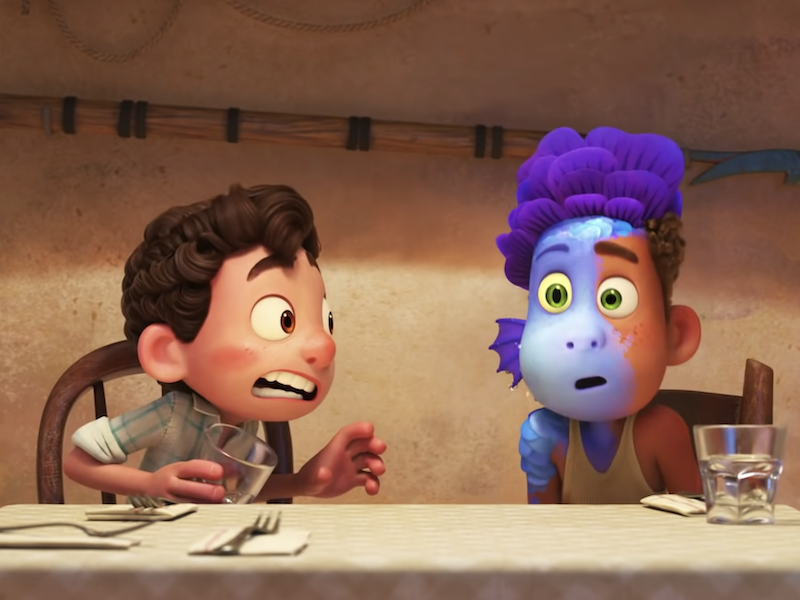eJewishPhilanthropy has over it's long (for a Jewihs internet outlet) existence developed a reputation for sharing a lot of news in the professional Jewish world - often in advance of the rumor mill. One of the things I have always loved about it (and it's founder) is the ability to find people who write brilliant opinion or thought pieces. They don't tell us about what has happened so much as make us think about what we ourselves might want to make happen, or about how we go about our professional or private lives. This ran last Thursday on eJP (click here to see it on their site - and make your comments there as well to take part in the larger conversation).
My wife and I LOVED Luca. From a story point of view I think it clearly outshone Encanto. And I like the impact of this Bruno a bit more than Bruno Mirabel - although his song is wonderful and John Leguizamo is amazing as always. From a musical and capture-the-hearts-of-children perspective, the Oscar rightly went where it did. But I am all about the story. I would have written my own piece, but Ben Vorspan already wrote a better one than I could have. For now anyway. Enjoy.
FILM APPRECIATION
The Jewishness of Disney’s ‘Luca’
Everything we say to others matters. In Judaism, every word has the potential to bring holiness or profanity into the world. How much more powerful then, are the words we say to ourselves? How can it be that we teach our children to be mindful of their words and language to others, but we often fail to support them when they have a nagging voice or worse, we model for them the toxic and limiting behavior of our own negative self-talk?
I recently enjoyed watching the magnificent and kaleidoscopic Disney/Pixar film “Luca.” The central story revolves around two new friends, one a slightly older street smart teen (Alberto), and the other a bright and curious younger boy (Luca). In their adventures, they collaborate to accomplish many things neither could do alone. At one point, when Luca is not feeling brave, he responds to Alberto’s invitation to join him, “Nope. I can’t do it. Never in a million years.” Alberto accesses his own grit, and says to Luca, “Hey, hey, hey. I know your problem. You’ve got a ‘Bruno’ in your head…I get one too sometimes: ‘Alberto, you can’t.’ ‘Alberto, you’re gonna die.’ ‘Alberto, don’t put that in your mouth.’ Luca, it’s simple. Don’t listen to (silly ol’) Bruno!”

SCREENSHOT
A frame from Disney's "Luca."
The simplicity of this scene is its brilliance. Since watching it with each of my sons, when they articulate self-doubt or worse, negative self-talk, I look at them, point and yell, “Silenzio Bruno!” It is pure Disney-meets-self-help-guru-magic. It breaks the tension, flips an intense moment into one of levity and allows us to connect and process whatever is on the mind.
Mindfulness practices and skills are essential at Jewish day schools. Whether through our social emotional learning programs or partnership with organizations like the Institute for Jewish Spirituality, these opportunities provide us with the tools to notice, interrupt and reframe negative self-talk. As someone immersed in this work, trust me when I say that there is no quicker way to integrate mindfulness into our own day, or that of our students or children, than using, “Silenzio Bruno!”
Once this tool is in the toolkit, we can go through the transformative steps of turning self-doubt into self-confidence. We identify the negative self-talk as negative, we “name” it (Bruno), and we take action and command it to stop (Silenzio!). This mindful process is an integral step in wellness and self-health.
As we move toward spring and Pesach, toward our holiday of the liberation of our people and nation, it can be a moment to break free from the Pharaoh’s voice within each of us. Rabbi Abraham Joshua Heschel taught that we can be a Pharaoh unto ourselves, that the true meaning of freedom is “the liberation from the tyranny of the self-centered ego.” In other words, while we eat the bread of affliction, we can embrace the virtue of self-compassion.
May this Passover — one to remember as we move out from two years of Seders where we were chained to our own homes or our Zoom screens — be one of great liberation! May we each have a silent Bruno, and maybe instead, find and name that internal, affirming voice, full of compassion, love and encouragement. Perhaps that name is none other than the one name Adonai, God of Compassion and Grace (YHVH El Rahum v’Chanun). That same compassionate voice we are so comfortable sharing with a friend, a student or family member… may we learn to hear it for ourselves.

